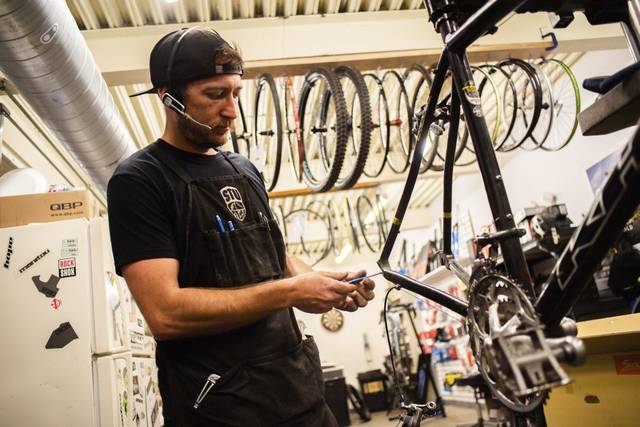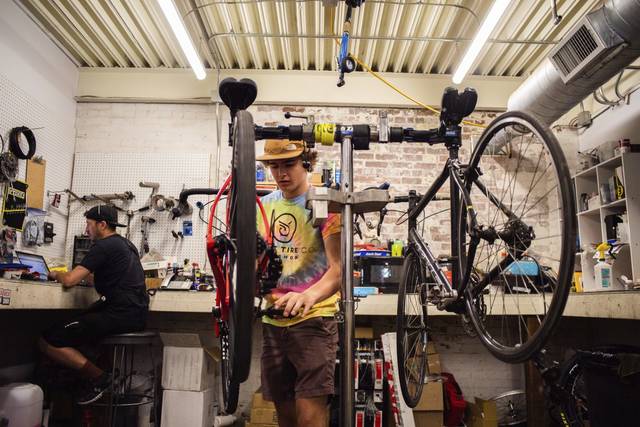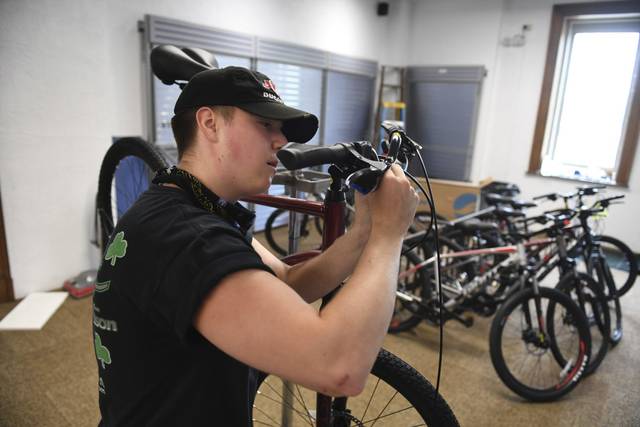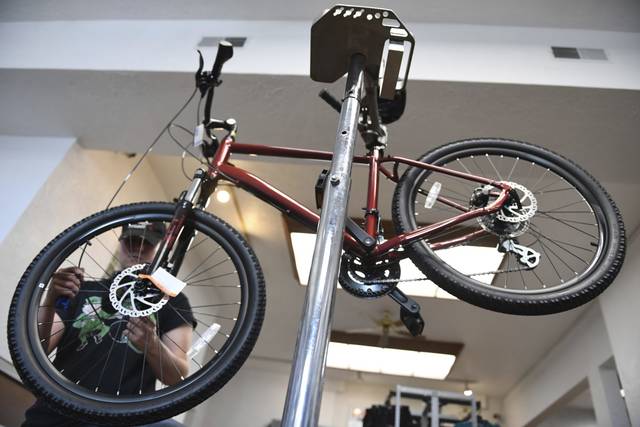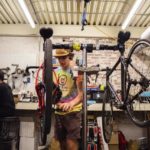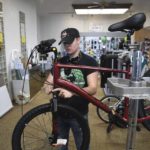June 3 marked World Bicycle Day and, to borrow a phrase from a former, lamented Pittsburgh Steeler, the bike business is boomin’.
Bike sales soared when covid-19 restrictions shut down many other forms of exercise and entertainment, and people took to the outdoors for a little fun.
“This is unprecedented,” says Sam Echard, owner of Greensburg Bike Shop in Youngwood. “We’ve sold every bike we had and we can’t get any more in. We’ve done at least five times our normal business.”
“It’s been crazy busy; we’ve had record sales,” says George Gatto, owner of Gatto Bicycles in Tarentum. “We’re selling through all our sizes and models. We did more business in two weeks in May than any month since the recession.”
But will it last?
When fitness centers, bowling alleys, bars, restaurants and other businesses welcome customers back, will the bikes return to gathering dust in the garage?
Gatto thinks they’ll stay on the road.
“What was that they told us in business school? If you do something for 30 or 40 days, it becomes a habit,” he says. “My feeling is that people are going to continue to do it.”
Ashley Reefer, owner of Flat Tire Bike Co. in Greensburg, predicts “a 25% retention rate” of the cycling phenomenon: “People who go to the gym are going to go back to the gym.”
“As hopeful as I remain, I think people will return to their normal routines within a year,” says Frank Bruno, owner of Biketek in Pittsburgh’s Squirrel Hill neighborhood. “People only ride where they feel safe, so if anything good comes out of this, I hope it’s that it will encourage lawmakers to build more bike and walking paths.
“It’s some of the cheapest infrastructure to build.”
Stepping stone
“The bike boom definitely helps our mission,” says Alexandria Shewczyk, marketing and communications director for Bike Pittsburgh, a nonprofit that advocates “to make biking and walking commonplace for all Pittsburghers in order to improve our quality of life and reduce the harmful effects of car dependence in our communities.”
“We hope this is a stepping stone for people to see how easy it is to replace a 2-mile car trip with a 2-mile bike trip,” she says. “We would like to see more options for all levels of cyclists, not just for exercise but for commuting, for safe and affordable ways to navigate Pittsburgh.”
It's #WorldBicycleDay ?
Cycling is good for us all:
Like all forms of physical exercise it helps maintain a balanced weight and prevent heart disease, stroke, diabetes, & some cancers. + it improves mental health & well-being.
??♂️??♀️
Ride your bicycle to #BeatNCDs! pic.twitter.com/7Eg4XRCf0P— World Health Organization (WHO) (@WHO) June 3, 2020
People looking to buy a bike now have some trouble, though, unless they have deep pockets.
“Models under $699 are sold out until the end of summer,” Bruno says.
“Right now, I can’t get any more new ones, except for the very expensive brands in the $2,000-$3,000 range, but most people aren’t going to spend that,” Echard says.
Reefer says her shop was anticipating an increase in sales prior to the coronavirus-related shutdown, so she still has plenty of inventory — but again, it’s mostly the more expensive models.
She explains that bike manufacturing follows the pattern of automobile manufacturing. The 2021 models will come out in the fall.
Nowadays, most bikes are made in Taiwan and China, and big box stores have the advantage over small shops by buying in bulk, Gatto says.
“When word gets out that bikes are available, the big shops are buying them up,” Echard says.
“Vendors have no idea when they can deliver, because they’ve been shut down, too. It’s definitely a seller’s market right now — there are no sales items,” Gatto says. “Our problem is that, when we run out, we don’t know what we’re going to do.”
Supply and demand
The scarcity extends to used bikes and bike parts, shop owners say. And with people pulling old bikes out of storage and wanting to make them roadworthy again, there’s a backlog for repairs.
“There are shortages in the supply chain, so unfortunately we can’t source parts,” Reefer says, noting that she recently turned a customer away because she couldn’t get the 26-inch wheel he needed.
The boom also has made bikes vulnerable to thieves, Bruno says.
“Every stolen bike that was stashed in a basement, someone is bringing it out,” he says. “When someone brings in a $900 bike and says they bought it for $150, you know it was stolen.”
Bike Pittsburgh is participating in a new program that should help with demand, Shewczyk says.
“BikePGH has partnered with Bike Match to connect people who have an extra bicycle with people who need one. Whether you have a bike or need a bike, we are here to help,” according to a release. “For this program, we will only accept bicycles that are in ready-to-ride condition or that only require minor maintenance (flat tire, basic adjustments or lubrication).”
Guidelines for donating a bike, requesting a bike and setting up a meeting for the exchange can be found at bikematch.safelanes.org/pittsburgh.





